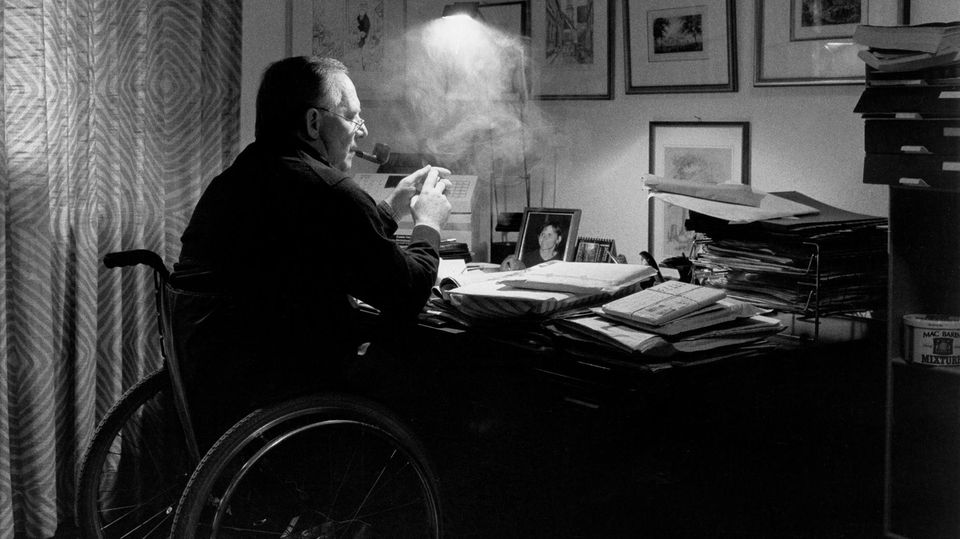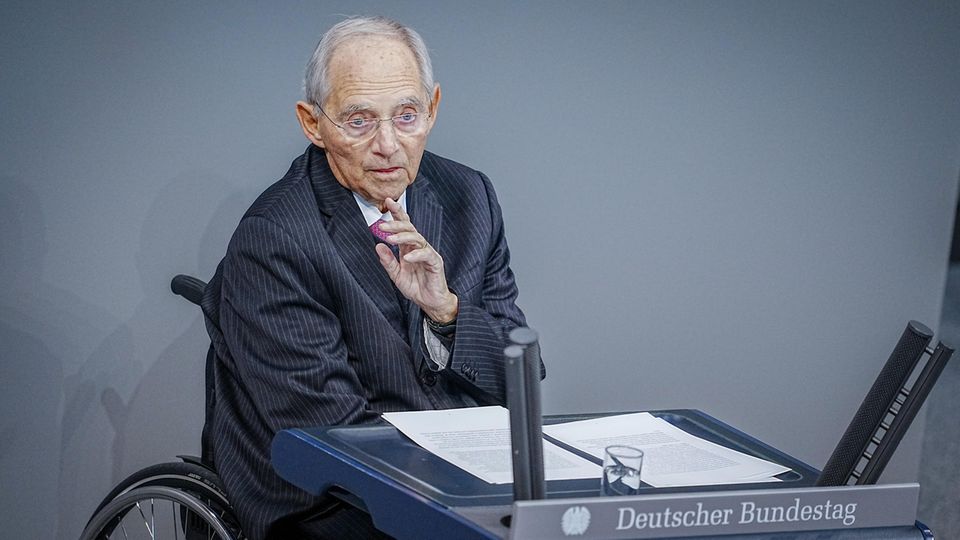With Wolfgang Schäuble there is a tendency to emphasize the tragic moments. His political life was very fulfilling for him.
Last June I requested an interview in Wolfgang Schäuble’s office. A day later the phone rang: “Schäuble.” He asked in his Alemannic dialect: “What exactly do you want to do?” We wanted to talk to him about the rise of the AfD, about his own party and much more. Schäuble was willing to do this, but he had already promised a similar interview to another newspaper and then went on vacation. We agreed to look for another opportunity.
On November 27th I wrote an email to Schäuble in which I returned to this appointment. She ended with the words: “I hope you are well and I send you my warmest regards.” I never sent this email because something kept coming up. In the end his death.
Wolfgang Schäuble died on December 26th and there was great shock. Of course, grief is never unanimous; Schäuble also had his “haters,” as we say today; People who value his mistakes more highly than his life’s achievements; Politicians who resent him for the defeats he inflicted on them or for the evil he caused them to do. And yet many expressions of sympathy from all directions were linked by a special respect.
Of course, Schäuble was also ambitious
Of course, this has to do with the fact that Schäuble suffered a severe personal blow with the assassination attempt in 1990 and yet he never gave up. Anyone who has ever sat at a table with him will remember the typical rotation with which Schäuble twisted his upper body into an upright position in a wheelchair. It seemed laborious; it made his paraplegic experience up close. And yet, in my perception, this sitting up also represented his claim to never let himself down, both literally and figuratively.
The respect for Schäuble may also have its roots in the contradiction that he embodied in relation to a widespread image of politics, according to which it is always just about positions. Of course, Schäuble was also ambitious. But he did not turn his back on politics for more than five decades, even though he was denied the very highest offices for which he seemed predestined. Didn’t he head the Chancellery for Helmut Kohl, negotiate the unification treaty with the GDR as Interior Minister and keep the CDU/CSU faction on track as chairman? Nevertheless, he couldn’t become Chancellor in 1998 – because Kohl didn’t want it. Didn’t Schäuble decide the vote on the government move to Berlin with the power of a speech? Nevertheless, he was unable to become Federal President in 2004 – because Angela Merkel didn’t want it. Nevertheless, he always carried on. “It’s okay, it’s okay” wasn’t just a saying for him. It’s easy to claim to be a passionate politician. He lived it.
I always had a sinking feeling when talking to Schäuble. You never knew what to expect. He was a fascinating conversation partner, educated and clear-headed. He could be funny, mocking, but sometimes aloof, self-absorbed, listless, sometimes brusque. Colleagues also sometimes found him cutting. Unforgotten is how, as finance minister, he humiliated his press spokesman in public because he had not distributed documents to journalists quickly enough.
Personally, I can’t complain. Once we were scheduled for an interview, for which Schäuble arrived far too late. He asked: “What do I do now?” I mentioned that beef roulades had already been put in the oven at my house in anticipation of my return, whereupon he immediately sent me home because roulades that had been braised for too long were inedible. He cleared a new appointment for the next morning.
The break with cabbage
I didn’t experience Schäuble’s years with Kohl in Bonn up close. How the Chancellor first elevated him to crown prince and then went into the fight for power himself. How Schäuble wanted to talk him out of what damaged their relationship before it completely fell apart in the CDU donations affair in 2000, and Schäuble documented this publicly with the sentence: “Mr. Kohl has so much pity for himself that he doesn’t need my pity. “
But I remember well the fall of 2012, when Schäuble caught up with that time again. On his 70th birthday, the Union faction organized a tribute in Berlin. The actor Ulrich Matthes read “Die Bürgschaft” by Friedrich Schiller, the famous ballad about friendship and loyalty, in the German Theater: “And loyalty, it is not an empty illusion.” Loyalty, a main motif in Schäuble’s life. The former chancellor was invited to the celebration, but did not show up.
Just one day later, the Konrad Adenauer Foundation celebrated the 30th anniversary of Kohl’s first election as Chancellor in 1982. Schäuble came, but only after the event had begun. So he was spared an almost unavoidable handshake with Kohl. Schäuble immediately drove his wheelchair into a niche that had been reserved for him in the front row, a few meters away from Kohl. So he maintained respect for the former chancellor, but ignored Kohl as a person. As guests flocked to a reception with Kohl after the event, Schäuble simply drove away.
So much history. When he attended his first CDU party conference in 1968, I was still wearing diapers. When he entered the Bundestag in 1972, I started school. He was an impressive personality in front of whom one could feel insignificant.
Once, when I visited him at the Ministry of Finance, he was humming a tune that I immediately recognized as an aria from Rossini’s “Barber of Seville.” I took the opportunity to impress him with my knowledge of opera. However, it wasn’t Rossini’s Barber at all, but Mozart’s Figaro. He corrected me and refrained from further ridicule.
Merkel and Schäuble spoke openly and argued
I was always particularly interested in his complicated relationship with Angela Merkel. He had supported her when she was a young minister. Her rise in politics was almost seamless. She later ignored him anyway and eventually moved in where he hadn’t made it: into the Chancellery. In addition to the many things he achieved, his career also consisted of some things he did not achieve. Not yours.
For many years they needed each other: he, her, because Merkel let him co-govern; she did it because Merkel was able to integrate an important part of the CDU with Schäuble. Merkel and Schäuble spoke openly and argued, especially during the euro crisis. But the minister accepted the primacy of the Chancellor, even if it was primarily respect for the office. He didn’t always think what she said was right. But it had to apply.
5 pictures
Both would have had opportunities to get rid of the other. But Merkel kept Schäuble in the office of finance minister in the midst of the euro crisis, even though he was out for several weeks due to a hospital stay. Schäuble, in turn, refrained from leading a campaign against Merkel after she had alienated large parts of the Union with her refugee policy. But the distance between the two grew after Merkel gave up the party leadership and heralded the end of her chancellorship.
In the summer of 2021, Schäuble invited some journalists to the Bundestag President’s official villa. He started telling stories, even making fun of them, but with respect until the end. It was a long evening. When it comes to Schäuble, one tends to emphasize the tragic moments, but one should not underestimate how fulfilled his political life was. “These stupid questions: Why are you still doing this to yourself?” he once said. “Because it makes me happy!”
With Schäuble’s death, more than that ends. A feeling of stability disappears. Schäuble was a great democrat and an enthusiastic European. And he had weaknesses and mistakes. But it often matters less how well people know a politician than what they project onto him. Schäuble seemed like someone who was left over from a time when politics still seemed manageable. He was associated with reason and reliability. If all else fails, there will always be someone like Schäuble – that was the case in the CDU and to a certain extent for the entire country.
Not anymore.
Nico Fried looks forward to hearing from you. Send him an email to [email protected]



